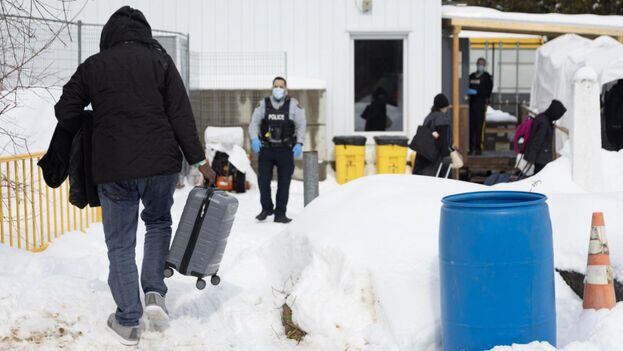
In 2016, Seidu Mohammed frozen all the fingers on his hands when he crossed the border between USA and Canada to ask for shelter. Politicians, experts and Seidu himself fear that the new border agreement signed by the two countries will increase the dangers for migrants.
Seidu is a happy man. As he rubs his face with his stumps, he doesn’t stop smiling. Less than a month ago, he obtained Canadian citizenship, six years after nearly dying while crossing the border on foot in the dead of winter.
Seidu, a soccer player in Ghana, comes out as bisexual and says he left his country for fear of being persecuted for his sexual orientation.
He began his journey in Brazil and suffered, like thousands of other refugees, an ordeal as he ascended through Central America until he reached the border between Mexico and the United States.
On US soil, Seidu sought refuge but was imprisoned for weeks along with common criminals.
After the 2016 elections, with the victory of the Republican Donald Trump, Seidu feared that he would be deported to Ghana. “So I decided to go to Canada”he explains to EFE in a call.
On Christmas Eve 2016, a taxi drove Seidu and another Ghanaian refugee, Razak Iyal, from the bus station in Grand Forks, North Dakota, to a point near the Canadian border.
Lost at -30 degrees
The driver, after charging them the last 600 dollars they had, told them that in 30 minutes they would be in Canada. With temperatures of 30 degrees below zero, in the middle of a storm and without enough warm clothing, the two walked for hours in the middle of the night.
When a trucker found them dying on a Canadian highway, both had frostbitten limbs. They recovered after weeks of treatment in a hospital. Seidu lost all the fingers on both hands. The doctors were able to save the thumbs from Razak’s hands.
“I am fully recovered, doing a lot of community work”Seidu explains with a smile. The new Canadian citizen is one of the founders of the Manitoba Africa Cup of Nations, a non-profit organization that helps black youth in the city of Winnipeg, in the center of the country, through soccer.
Seidu has also created two other organizations in Winnipeg to help youth and newcomers to the country. And she intends to study at the university.
“It’s my way of giving back to Canada for everything it has done for me”Explain.
In late March, shortly after Seidu became a Canadian citizen, US President Joe Biden visited Canada.
Following their meetings with the country’s Prime Minister Justin Trudeau, the two rulers announced the immediate entry into force of a new border agreement that effectively prevents refugee claimants from reaching Canada as Seidu did.
Fear among refugees
“When I heard it, I was scared. It’s going to put a lot of refugees in danger because the United States is not a safe country (for refugees). They are not protected”said.
On March 30, days after Canada and the United States put the new border agreement into effect, eight people, members of two families from India and Romania, died trying to enter the United States illegally.
In the case of the Romanian family, made up of the Florin and Monalisa Iordache couple, both 28 years old, and their two children, Evelyn, two years old, and Eylen, 18 months old, the Canadian authorities had ordered their expulsion after rejecting their asylum request.
Laura Madokoro, a professor at Carleton University, in Ottawa, and an expert in migration and humanitarianism, explained to EFE that it is not known if there is a direct relationship between the new border agreement and the death of the eight people.
What is clearer for the academic is that “The ad is scaring people on both sides of the border because they don’t know what it’s going to mean to them or what they have to do”.
The deputy of the social democrat New Democratic Party (NPD), Jenny Kwan, agrees with Seidu that the agreement reached between Trudeau and Biden increases the risks for those seeking refuge.
“All it will do is push people down more dangerous routes. The creation of this invisible wall is, in my opinion, a violation of Canada’s international commitments on the rights of asylum and refugee seekers.”the deputy told EFE.
“It turns my stomach. I don’t even wish my worst enemy to go through what I had to go through to get to Canada. They have to suspend it (the border agreement)”Seidu concluded.
Source: EFE
Source: Gestion
Ricardo is a renowned author and journalist, known for his exceptional writing on top-news stories. He currently works as a writer at the 247 News Agency, where he is known for his ability to deliver breaking news and insightful analysis on the most pressing issues of the day.












